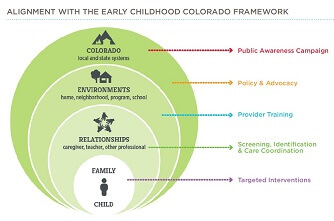A diagram which shows how the First 1,000 Days strategies reach dfiferent groups who care for children
Picture a four-year-old child coming with his mother to the pediatrician’s office for his annual well-child visit. In the course of the health check-up, the mother asks the care provider to speak to someone in the office about her son’s behavior, which is causing problems in preschool.
As part of this conversation guided by basic screening questions, the provider learns that the parents are recently divorced, that there is a history of domestic violence and that the child’s behavior issues include tantrums, difficulty sleeping, hitting and refusing to leave his mother. The mother is worried that the child will be expelled from preschool and then she will have to leave her job to care for him.
This scenario reflects how the difficulties a young child faces can affect that child’s experience and behavior in school and other environments, and how a routine well-child visit can be the time when a parent seeks help for these issues. Research in this area shows that stressors like the ones experienced by this child can affect not only behavior and school readiness, but physical health – including cardiovascular disease, diabetes and infectious illness.
About five years ago, Rose Community Foundation’s Health Committee, along with the Child and Family Development Committee began to explore the topic of mental health care for very young children. Early childhood mental health is also sometimes referred to as children’s social-emotional development. Both committees believed it important to understand what early childhood mental health is, how a child’s mental health can affect his or her life and future and how to build prevention and early intervention into existing systems. Both committees also understood that collaborating with other funders interested in this area could work to make progress more quickly than if each funder worked in isolation.
Now, five years and several grants into this learning process, the issue of early childhood mental health is gaining momentum, locally and nationally in both health and funding communities. “We can see that awareness of early childhood mental health is growing,” says Whitney Connor, senior program officer. “You can find TED talks about the issue online, and terms like ‘toxic stress’ are gaining wider understanding.” Toxic stress is used to describe the kind of stress the child in the earlier example is suffering; just like other environmental toxins, the stress builds up with long-term consequences for the child’s health and wellness. Connor goes on to say “My hope is that we continue to make the right investments along with our partners to sustain this momentum, both her in Colorado and nationally.”
Research is also increasingly clear that mothers’ mental health during pregnancy and children’s early years is important. A recent two year grant to Colorado Access is one example of how research about maternal mental and social and emotional health is now becoming implemented in primary care settings. Colorado Access is a nonprofit health plan that provides children’s and pre-natal care for Medicaid patients. A Rose Community Foundation grant will fund a pilot project to implement a telehealth-based integrated care for pregnant and post-partum women at risk for depression. Telehealth delivers health care services through video-conferencing and other tools, which allows patients to receive high quality comprehensive care and monitoring at potentially lower costs. So, mothers-to-be who might not otherwise have access to mental health screening and monitoring will have regular access throughout their pregnancy and after, thus helping their babies come into a safe and healthy environment.
Rose Community Foundation has also recently made a grant to the Children’s Hospital Colorado Foundation to support the First 1,000 Days initiative, which is concerned with children from birth through age 2. This comprehensive effort focuses on improving health outcomes for young children and families by screening regularly for mental and social stressors and then providing appropriate support and care if their personal circumstances are negatively affecting children’s health and well-being. The initiative is intentionally working and measuring change on five fronts: public awareness; policy and advocacy; provider training; screening, identification and care coordination; and targeted interventions.
Psychologist Ayelet Talmi serves as co-leader of the First 1,000 Days initiative, and has spent most of her career working as a provider and as a leader in the effort to make mental health care more available and accessible. She says that First 1,000 Days strategies (see diagram) have internal and external implications. Some of the work is grounded in hospital-based and network of care pediatric practices that are part of Children’s Hospital Colorado, and it has intentional links to external initiatives and partnerships. There is the potential to inform the care community around the state, not just at Children’s. “Alignment of this work is both a challenge and an opportunity,” she says. “Each of the five strategies overlaps and influences the others. It is complicated but it is transformational, systemic change.”
She goes on to say that the partnership of foundations and other funders has been critical to being able to take on this systemic change. “The funding community in Colorado has invested deeply, and over a long period of time, so we could be creative and innovative, and work towards sustainability,” she says. “Members of the philanthropic community have been partners all along the way. Their collective investment in infrastructure for early childhood is the envy of other states and sets a high bar for national efforts.”
Both of these projects reflect the intentional integration of mental and social-emotional health screening and intervention into regular preventive health care for mothers and young children. Both organizations – Colorado Access and the Children’s Hospital Colorado network – also have the potential to identify the most successful practices in this area and replicate them more broadly.
Just as these efforts are spreading in the medical community, they are also gaining visibility both with funders and in the medical community. Connor recently co-authored an article about the collaboration of Denver funders in this area for The Foundation Review, a quarterly publication of the Johnson Center for Philanthropy. This article will help raise visibility both for the importance of early childhood mental health, and for the effective collaboration of funders in the Greater Denver community to address it.

